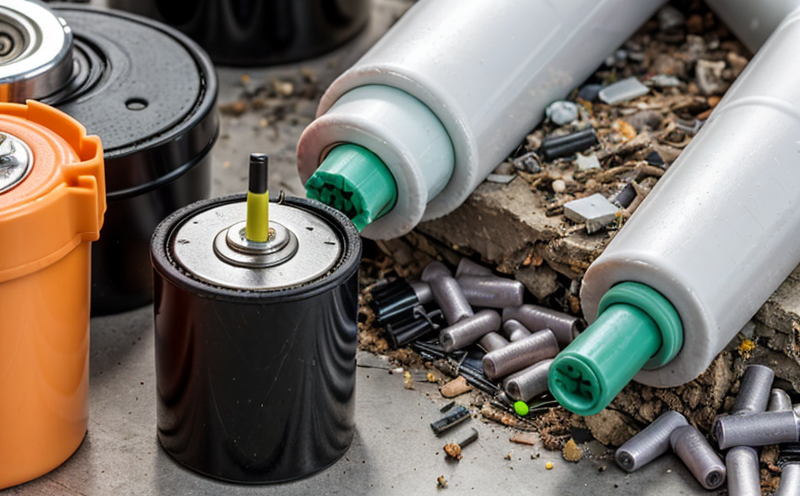EN 62619 End-of-Life and Recycling Testing of Industrial Lithium Batteries
The European standard EN 62619:2013 provides a framework for the testing, recycling, and disposal of industrial lithium batteries. This stringent regulation aims to ensure that end-of-life batteries are processed in an environmentally responsible manner without compromising safety or performance.
Industrial lithium batteries play a crucial role in various sectors including automotive, aerospace, and telecommunications. As these batteries reach their end of life, it is imperative that they be tested for proper recycling processes and disposal methods. The testing outlined in EN 62619 ensures the integrity of materials recovered from such batteries, allowing for the production of new lithium-ion cells.
The standard covers various aspects including mechanical stability tests, electrical performance tests, thermal behavior assessment, and chemical analysis to ensure that recycled materials meet the required quality standards. Compliance with this regulation is essential not only for environmental protection but also to avoid legal repercussions associated with improper disposal practices.
Our laboratory offers comprehensive EN 62619 testing services tailored specifically to industrial lithium batteries. Our team of experts ensures that all tests are conducted according to international standards, providing accurate and reliable results crucial for meeting regulatory requirements.
For instance, during mechanical stability tests, we subject the battery samples to various stress conditions replicating real-world scenarios such as drop tests or vibration exposure. Similarly, electrical performance tests measure key parameters like internal resistance, capacity retention, and self-discharge rates under different operating temperatures.
The thermal behavior assessment involves monitoring the battery's temperature rise during charging/discharging cycles or short-circuit events to determine its stability at elevated temperatures which is critical for preventing potential hazards during recycling processes.
Chemical analysis helps identify trace elements present within the batteries that could be valuable when considering secondary raw materials. By ensuring these elements are extracted efficiently, we contribute towards sustainability goals while maintaining product quality standards.
Scope and Methodology
| Test Type | Description | Application |
|---|---|---|
| Electrical Performance Tests | Includes measuring capacity, internal resistance, self-discharge rate under various conditions. | Assures battery performance remains consistent post-recycling. |
| Mechanical Stability Tests | Replicates real-world stresses like drops or vibrations to evaluate structural integrity. | Evaluates potential risks associated with handling recycled materials. |
| Thermal Behavior Assessment | Monitors temperature changes during charging/discharging cycles to ensure safe recycling practices. | Prevents hazardous situations in processing facilities. |
| Chemical Analysis | Determines presence and concentration levels of valuable metals like lithium, cobalt, nickel etc. | Facilitates efficient extraction processes for secondary raw materials. |
| Parameter | Test Methodology | Expected Outcome |
|---|---|---|
| Mechanical Integrity | Durability tests involving simulated mechanical stress. | Confirmation of structural soundness post-recycling. |
| Electrical Characteristics | Continuous monitoring and data logging during specified operations. | Data points on battery health, performance degradation over time. |
| Thermal Stability | Controlled environmental chambers simulating diverse operating conditions. | Evidence of stable operation across temperature ranges. |
| Chemical Composition | Spectroscopic analysis to identify elemental content accurately. | Quantitative data on metal concentrations suitable for reutilization. |
Quality and Reliability Assurance
The quality assurance process in our EN 62619 testing begins with rigorous sample preparation ensuring consistency across all tests. This involves precise cutting, cleaning, and conditioning of battery cells before they undergo any mechanical or electrical stress.
Our team uses state-of-the-art equipment calibrated according to international standards to conduct these evaluations accurately and consistently. Each test is performed multiple times under controlled conditions to ensure repeatability and reliability of results.
We employ advanced analytical techniques like Inductively Coupled Plasma Mass Spectrometry (ICP-MS) for precise chemical analysis, Differential Scanning Calorimetry (DSC) for thermal behavior assessment, and Automated External Terminal Resistance Tester (AETRT) for electrical performance evaluation. These sophisticated tools allow us to capture detailed insights into the state of each battery sample.
The comprehensive nature of our testing ensures that only compliant materials are recovered from industrial lithium batteries, thereby supporting sustainable practices throughout their lifecycle. Our commitment to accuracy and precision guarantees compliance with EN 62619 requirements while delivering valuable data for R&D purposes.
International Acceptance and Recognition
The European standard EN 62619 is widely recognized across numerous countries due to its stringent requirements aimed at safeguarding both human health and environmental sustainability. Many nations have adopted this standard as a benchmark for best practices in managing end-of-life lithium batteries.
Our laboratory actively participates in international forums discussing advancements in battery recycling technologies, contributing towards global standards harmonization efforts. By adhering strictly to EN 62619 guidelines, we ensure our clients receive consistent results that are universally accepted by regulatory bodies worldwide.
The widespread acceptance of this standard underscores its importance within the industry; it serves as a guiding principle for all stakeholders involved in handling industrial lithium batteries responsibly post-consumer use. Compliance with these regulations not only enhances corporate reputation but also facilitates smoother operations for businesses operating internationally.





